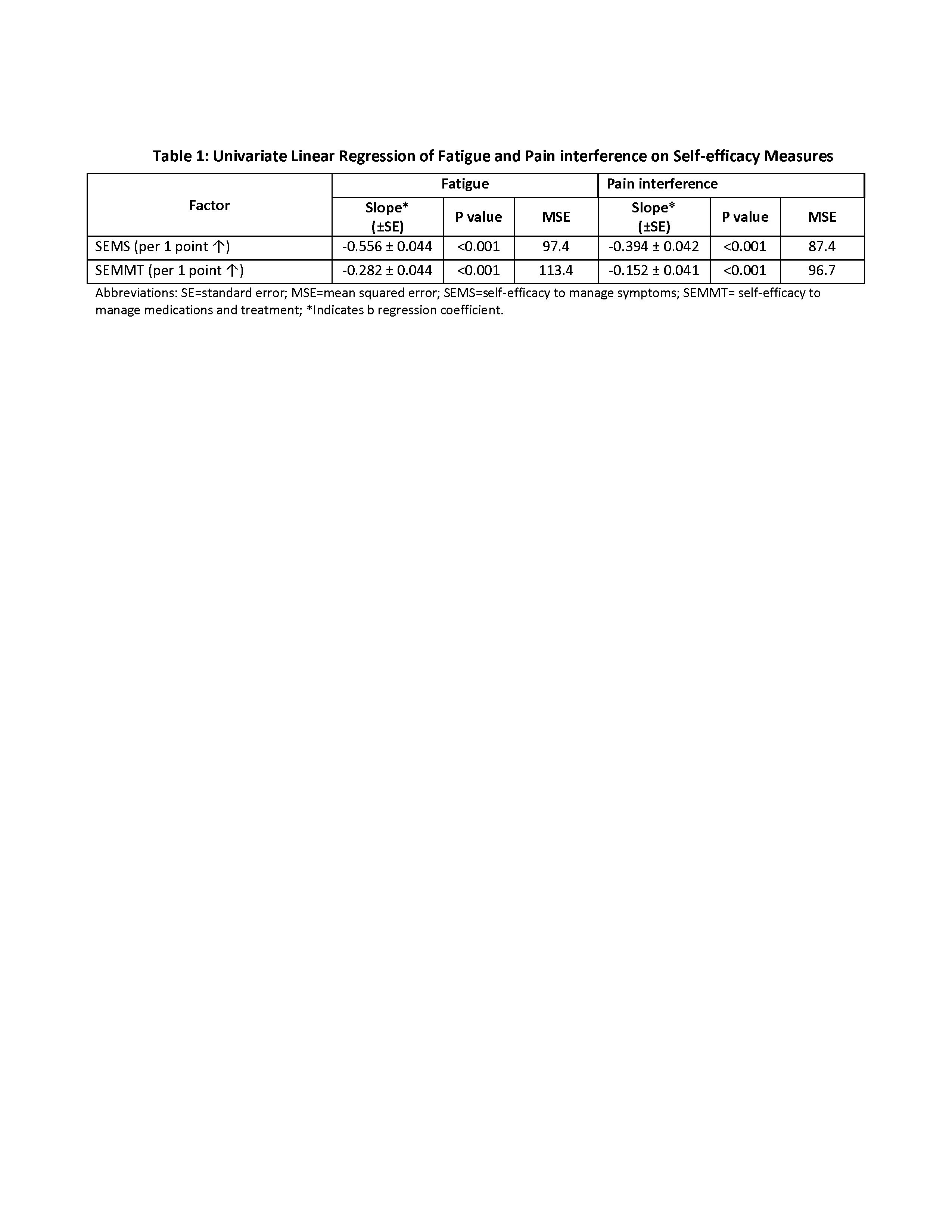Session Information
Date: Saturday, November 6, 2021
Title: Patient Outcomes, Preferences, & Attitudes Poster I: Impact (0225–0240)
Session Type: Poster Session A
Session Time: 8:30AM-10:30AM
Background/Purpose: Fatigue and pain are pervasive symptoms that cause escalating distress in patients with SLE, particularly among Black women and other high-risk groups. While these are reportedly amongst the most challenging symptoms to self-manage by SLE patients, self-efficacy can mitigate their negative impact on daily activities. However, older and depressed patients and those with low education may have low self-efficacy. We examined whether self-efficacy affects fatigue and pain interference in Black women with SLE, and whether depression, age, and education alter those relationships.
Methods: Transversal analysis of Black women with a validated diagnosis of SLE, who were enrolled in a population-based cohort called the Georgians Organized Against Lupus (GOAL). PROMIS short forms were used to measure Fatigue, Pain interference, Self-efficacy to manage symptoms (SEMS), Self-efficacy to manage medications and treatment (SEMMT), and Depression. Linear regression analyses were performed to examine the relationship between each outcome (Fatigue and Pain interference) and self-efficacy (SEMS and SEMMT) and the interactions of age, education, and depression with self-efficacy, after adjusting for confounders.
Results: Of 699 participants, 143 (21%) were 18-34, 329 (47%) 35-54, and 227 (33%) >55 years old; 261 (37%) attained <high school, 226 (32%) some college, and 211 (30 %) >bachelor’s degree. Table 1 shows an inverse association between Fatigue and SEMS, Fatigue and SEMMT, Pain interference and SEMS, Pain interference and SEMMT. Figure 1 depicts significant interactions between SEMS*Depression (p=0.03), SEMMT*Depression (p=0.006), SEMS*Education (p=0.03) and SEMMT*Education (p=0.009) on Fatigue. Figure 2 shows significant interactions between SEMMT*Depression (p=0.03), SEMS*Age (p=0.03), and SEMS*Education (p=0.0009) on Pain Interference. After adjusting for confounders, SEMS*Depression (p=0.04) and SEMMT*Depression (p=0.009) remained significantly associated with Fatigue, and SEMS*Depression with Pain Interference (p=0.05), with greater adjusted means of each outcome in those with higher depression. SEMS*Education remained significantly associated with Fatigue (p=0.05) and with Pain interference (p=0.04), with lower adjusted means in those with higher education. SEMS*Age was associated with Pain interference (p=0.02), with higher adjusted means of each outcome in older women.
Conclusion: Self-efficacy (to manage symptoms and to manage medications and treatment) were inversely related to both fatigue and pain interference. Depression, age, and education altered those relationships in different ways. These finding may help predict who might benefit most from to efficacy-enhancing interventions.
To cite this abstract in AMA style:
Drenkard C, Easley K, Bao G, Dunlop-Thomas C, Brady T, Lim S. The Effects of Self-efficacy on Fatigue and Pain Interference in Black Women with Systemic Lupus Erythematosus: The Role of Depression, Age, and Education [abstract]. Arthritis Rheumatol. 2021; 73 (suppl 9). https://acrabstracts.org/abstract/the-effects-of-self-efficacy-on-fatigue-and-pain-interference-in-black-women-with-systemic-lupus-erythematosus-the-role-of-depression-age-and-education/. Accessed .« Back to ACR Convergence 2021
ACR Meeting Abstracts - https://acrabstracts.org/abstract/the-effects-of-self-efficacy-on-fatigue-and-pain-interference-in-black-women-with-systemic-lupus-erythematosus-the-role-of-depression-age-and-education/



